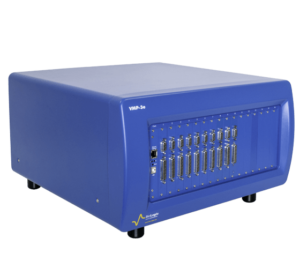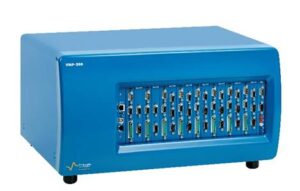
Rechargeable batteries are everywhere: in your phone, your e-bike or e-car, wireless speakers or other applications. And not just in personal appliances: medical equipment often runs on batteries, as do drones. It is no wonder that the 2019 Nobel Prize for Chemistry was awarded for the development of Li-ion batteries.
A Battery Cycler is a vital instrument for both research and testing of rechargeable batteries. Assessing the ‘health’ of a rechargeable battery is complex, as many factors govern its behaviour. To allow for maximum research into the function of batteries, ST Instrument offers the BioLogic BCS-9xx series battery cycling test stations, the newest line of advanced battery cyclers on the market.
This modular product is well-suited for research and development, quality control and academic research. These instruments are also equipped with high quality EIS (Electrochemical Impedance Spectroscopy) functionality.

 Key Features and Benefits
Key Features and Benefits
♦ Module mixing: Plug and Play
♦ Supplied with dedicated new BT-Lab® Software Suite
♦ High quality Electrochemical Impedance Spectroscopy (EIS)
 Applications
Applications
♦ Battery & intercalation compounds
♦ Battery cycling
♦ (Super)capacitors
How does a battery cycler work?
A battery cycler will analyse battery function through charge/discharge cycles, by measuring the cells response over time. During battery cycling, a number of parameters can be measured, including capacity, efficiency of the battery and self-discharge. The battery cycler is also suitable for use with capacitors and supercapacitors.
Each module of the BCS-9xx series is composed of 8 channels, and is equipped with five charge currents ranges. The BT-Lab software offers great usability for battery cycling. With the Modulobat technique it is possible to work with 11 different control modes, which allows for easy programming of unique sequences.
In battery cycling, the classic charge/discharge testing measures the net result of all the electrochemical processes taking place inside the cell. In addition to charge/discharge testing, the use of Electrochemical Impedance Spectroscopy (one of the control modes) has become more popular in recent years. EIS, especially in the low frequency range, can be used to monitor and control the degradation of the battery,
Why use a BioLogic battery cycler?
The state-of-the-art-system is modular, and has superior performance and specifications. These include the 5 current ranges (every decade), 18 bit resolution in current and voltage, high precision coulometry, fast bandwidths (rise and fall times), smart sampling, interfacing with external equipment and temperature probes and many more.
Another unique feature of the BCS-9xx battery cyclers is the capability of doing Electrochemical Impedance Spectroscopy (EIS) experiments. With a frequency range of 10 kHz to 10 mHz the BCS-9xx battery cycler is Ideal for studying battery properties.
A method to determine the lifespan of batteries in a relatively short period (weeks) without the need to operate at elevated temperatures is High precision Coulometry (HPC). High precision coulometry was developed in 2010 by Dr. Jeff Dahn’s laboratory at Dalhousie University, Nova Scotia, Canada and requires very accurate measurements of the charge/discharge quantities from a battery. Degradation rates are calculated from the difference between charge and discharge values. The BCS-9xx battery cyclers deliver ultra-high precision measurements for optimal predictions.
Examples of applications
Simulation of complex battery cycles that model real life activity.
The BT-Lab software allows you to simulate real-life activity, like the profile for an electric car driving in an urban area during rush hour. Such a simulation requires thousands of steps, which makes the creation of such files very difficult and time consuming. To make this easier, there is a tool in the software to import a txt file to mimic this kind of profile. Furthermore, algorithms will check a number of parameters or mismatch with the instrument or the battery, and warn the user during programming of a test cycle.
Supercapacitors
Supercapacitors are among the most promising devices for energy storage. These capacitors deliver charge much faster than batteries, and tolerates many more charge and discharge cycles than rechargeable batteries. Using a battery cycler, the charge/discharge capacities can be investigated with a potential scan and constant power discharge.
These potentiodynamic and constant power discharges allow you to characterize the cycling performance of the supercapacitor. Using these characterizations, it is possible to determine if the studied supercapacitor fits the need (according to its corresponding pulse output) of the electronic device to powered.

Why BioLogic?
♦ A unique and complete product range
♦ Modular systems
♦ Controlled by a powerful suite of software
 Related products
Related products
Electrochemical workstation with up to 16 individual channel
High-end battery tester series
16 channels – The ultimate electrochemical workstation




